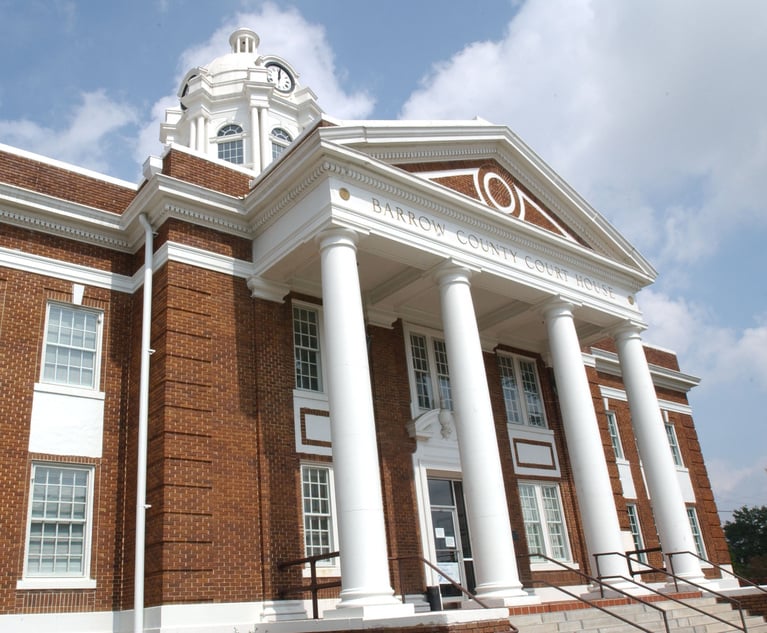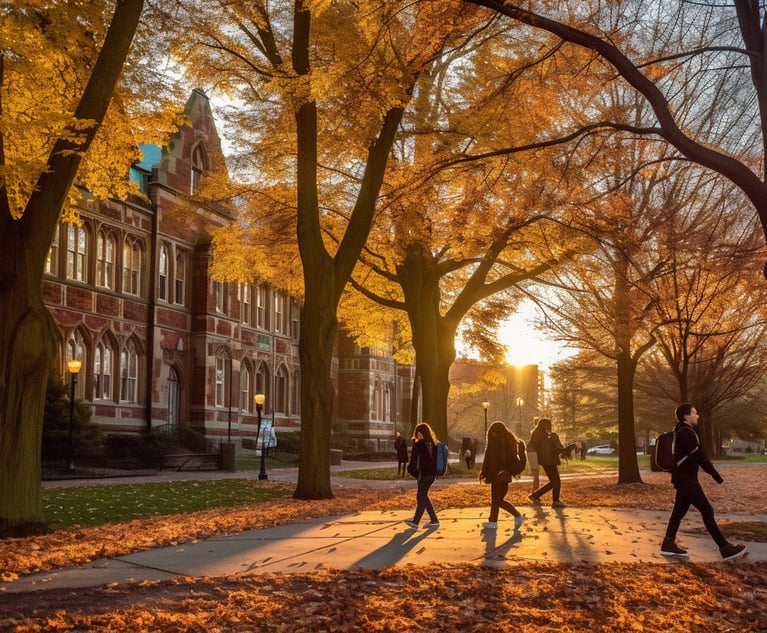July Bar Exam Alternatives Under Consideration Amid COVID-19
A group of legal educators are pushing bar examiners to come up with alternative ways to license this year's crop of law grads amid the coronavirus outbreak.
March 23, 2020 at 02:17 PM
6 minute read
The original version of this story was published on Law.com
 Photo: Hewlett Askew
Photo: Hewlett Askew
The July bar exam is still more than four months away, but a group of legal educators are imploring bar officials to make a decision now about alternatives to the licensing exam amid the coronavirus pandemic.
In a working paper titled "The Bar Exam and COVID-19: The Need for Immediate Action," the authors—11 law professors and education policy experts—lay out six options for how to deal with the law students who are graduating this year, arguing that it will be impossible to administer the bar exam in the traditional manner this year.
"Even if some of the most rigorous restrictions have been lifted by July 28, prohibitions on large gatherings are likely to remain," the paper reads. "Attempting to administer the bar exam to hundreds of test takers in a single room would endanger the test takers, staff administering the exam, and the public health."
If the bar exam is not administered, students would be held in a limbo for months without alternative approaches to attorney licensing, and in certain parts of the country, there could be a pressing need for lawyers.
But Judith Gundersen, the president of the National Conference of Bar Examiners—the entity that develops the test—said Monday that jurisdictions should not rush into any decisions about the July exam.
"This is a rapidly evolving situation, and there is still a lot of uncertainty about what will happen with COVID-19 in the months ahead," she said. "It is important that decisions about the July bar examination are made thoughtfully and with appropriate due diligence. While each jurisdiction ultimately makes its own decisions about licensing new lawyers, we believe a coordinated response among jurisdictions, to the extent that's possible, will help minimize misinformation and confusion among candidates and the public."
The six options proposed in the paper are:
- Postpone the bar exam. This option is likely to fail because subsequent waves of COVID-19 outbreaks will likely make it impossible to predict when will be a safe time to gather large numbers of test takers together, according to the paper.
- Administer the bar exam online. This option is also likely to fail because even if bar examiners could make the switch to administering the exam digitally, questions remain about the security of the test.
- Give the exam in small groups of no more than 10 people. Again, this option faces significant logistical problems because it would be difficult for jurisdictions to source enough locations and proctors, and would pose health risks, the paper reads.
- Issue an emergency diploma privilege to 2020 J.D. graduates of American Bar Association-accredited law schools. This idea borrows from Wisconsin's diploma privilege system, which allows graduates of the state's two law schools to practice there without taking a bar exam.
- Adopt an "emergency diploma privilege-plus," whereby jurisdictions could add some additional educational requirements for 2020 J.D.s, such as online CLE or other courses; certification of extra credentials such as completion of an externship or clinic; or other "bridge the gap" programs.
- Adopt a supervised practice program where 2020 J.D.s may practice under the close supervision of a licensed attorney.
The paper argues that the last three options are more feasible than the first three.
Ohio State University law professor Deborah Jones Merritt, who is one of the paper's 11 authors, said in an interview Monday that the authors did not all coalesce over any single option, and that the right approach will likely vary between jurisdictions. States are being impacted by COVID-19 in different ways, the number of law schools within jurisdictions vary widely, and some states have many new lawyers coming in from schools in other jurisdictions—all of which will play into how bar officials approach the current challenges, Merritt noted.
Merritt said she favors a combination of the emergency diploma privilege and supervised practice options.
"If every state wanted to do the diploma privilege, maybe with a few other requirements as we suggest in the paper—and give reciprocity to each other—that would work quite effectively I think," she said. "But time is short and it might be hard for states to get the guarantee that they would receive that reciprocity."
Thus, if jurisdictions would grant a diploma privilege to graduates of law schools within their state, then graduates of out-of-state law schools could still come in and practice under the supervised practice option. That would reduce the number of licensed lawyers needed to supervise new graduates, Merritt said.
Gundersen said the national conference is working with individual jurisdictions to find flexible ways to deal with the July bar exam. Among the options on the table is rescheduling the test, and the temporary expansion of student practice rules could be effective.
The New York State Bar Association's Task Force on the New York State Bar Examination is meeting on an emergency basis and will make recommendations to the state's court system on how to address the test.
"Depending on the duration of the crisis, it may not be possible to hold the bar exam this July," said state bar president Henry Greenberg. "That judgment needs to be made soon, as graduating law school students are understandably anxious to take their place in this profession, and need to know when and how best to prepare for the bar exam."
But Gundersen cautioned against making decisions too quickly.
"It is not clear that it is imperative to quickly adopt alternative methods of licensure, as proposed in the white paper, particularly at a time when courts and bar admission offices are working overtime (and remotely) to respond to this crisis," she said.
The authors of the paper disagree, however.
"In addition to protecting the public health, we need to preserve the mental health of the candidates hoping to join our profession this year," it reads. "All are panicked about whether they will be able to take the bar exam this summer and, if not, how they will cope. Will they be able to find jobs without a law license? Will they study intensely for the bar only to discover that the exam has been cancelled or postponed? This emotional stress is building by the day: some students report that they are struggling to focus on their remaining classes because they are so worried about whether they will be licensed later this year."
NOT FOR REPRINT
© 2025 ALM Global, LLC, All Rights Reserved. Request academic re-use from www.copyright.com. All other uses, submit a request to [email protected]. For more information visit Asset & Logo Licensing.
You Might Like
View All
From 'Confusing Labyrinth' to Speeding 'Roller Coaster': Uncertainty Reigns in Title IX as Litigators Await Second Trump Admin
6 minute read
University of Georgia School of Law Finds Next Dean on Its Own Faculty
3 minute read
Teen Charged in Barrow School Shooting and His Father to Stay in Custody After Hearings
5 minute readTrending Stories
Who Got The Work
Michael G. Bongiorno, Andrew Scott Dulberg and Elizabeth E. Driscoll from Wilmer Cutler Pickering Hale and Dorr have stepped in to represent Symbotic Inc., an A.I.-enabled technology platform that focuses on increasing supply chain efficiency, and other defendants in a pending shareholder derivative lawsuit. The case, filed Oct. 2 in Massachusetts District Court by the Brown Law Firm on behalf of Stephen Austen, accuses certain officers and directors of misleading investors in regard to Symbotic's potential for margin growth by failing to disclose that the company was not equipped to timely deploy its systems or manage expenses through project delays. The case, assigned to U.S. District Judge Nathaniel M. Gorton, is 1:24-cv-12522, Austen v. Cohen et al.
Who Got The Work
Edmund Polubinski and Marie Killmond of Davis Polk & Wardwell have entered appearances for data platform software development company MongoDB and other defendants in a pending shareholder derivative lawsuit. The action, filed Oct. 7 in New York Southern District Court by the Brown Law Firm, accuses the company's directors and/or officers of falsely expressing confidence in the company’s restructuring of its sales incentive plan and downplaying the severity of decreases in its upfront commitments. The case is 1:24-cv-07594, Roy v. Ittycheria et al.
Who Got The Work
Amy O. Bruchs and Kurt F. Ellison of Michael Best & Friedrich have entered appearances for Epic Systems Corp. in a pending employment discrimination lawsuit. The suit was filed Sept. 7 in Wisconsin Western District Court by Levine Eisberner LLC and Siri & Glimstad on behalf of a project manager who claims that he was wrongfully terminated after applying for a religious exemption to the defendant's COVID-19 vaccine mandate. The case, assigned to U.S. Magistrate Judge Anita Marie Boor, is 3:24-cv-00630, Secker, Nathan v. Epic Systems Corporation.
Who Got The Work
David X. Sullivan, Thomas J. Finn and Gregory A. Hall from McCarter & English have entered appearances for Sunrun Installation Services in a pending civil rights lawsuit. The complaint was filed Sept. 4 in Connecticut District Court by attorney Robert M. Berke on behalf of former employee George Edward Steins, who was arrested and charged with employing an unregistered home improvement salesperson. The complaint alleges that had Sunrun informed the Connecticut Department of Consumer Protection that the plaintiff's employment had ended in 2017 and that he no longer held Sunrun's home improvement contractor license, he would not have been hit with charges, which were dismissed in May 2024. The case, assigned to U.S. District Judge Jeffrey A. Meyer, is 3:24-cv-01423, Steins v. Sunrun, Inc. et al.
Who Got The Work
Greenberg Traurig shareholder Joshua L. Raskin has entered an appearance for boohoo.com UK Ltd. in a pending patent infringement lawsuit. The suit, filed Sept. 3 in Texas Eastern District Court by Rozier Hardt McDonough on behalf of Alto Dynamics, asserts five patents related to an online shopping platform. The case, assigned to U.S. District Judge Rodney Gilstrap, is 2:24-cv-00719, Alto Dynamics, LLC v. boohoo.com UK Limited.
Featured Firms
Law Offices of Gary Martin Hays & Associates, P.C.
(470) 294-1674
Law Offices of Mark E. Salomone
(857) 444-6468
Smith & Hassler
(713) 739-1250







